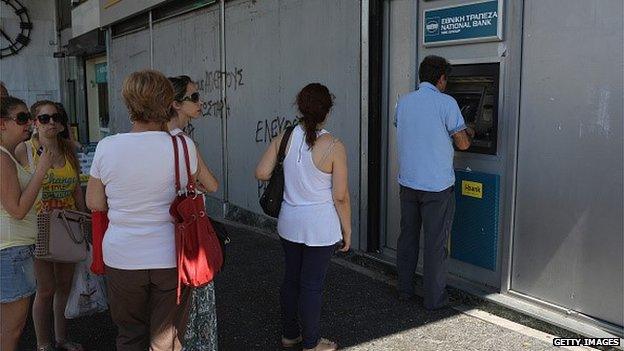ECB tightens squeeze on Greek banks
- Published
- comments

Queues continue to grow at Greek cash machines
More bad news for Greece this evening, and again it is from the European Central Bank.
It has told Greek banks they have to lodge more collateral or assets with the Bank of Greece as security against the €89bn of emergency lending or ELA (emergency liquidity assistance) provided to the banks.
What does this mean?
Well it reduces the spare cash-raising capacity of the banks from €17-20bn to between €5-7bn. Or so I am told, by well-placed sources.
Now in one sense this is academic, because the ECB has also announced that the freeze on the total amount of ELA it will allow the Bank of Greece to do, which was announced on June 26 - and forced the Greek government to close the banks - will stay in place.
Or to put it another way, the tap of additional central bank support for the banks remains firmly turned off.
But I understand that one of the Big Four Greek banks has already almost run out of cash. So the ECB statement means that bank has no ability to replenish its dwindling cash stocks.
In other words, the ECB has brought forward the fateful moment when the Greek banking system ceases to function in any meaningful way, for want of cash.
The Greek government and Bank of Greece today agreed with the banks that until Wednesday night, they will continue to allow cash withdrawals of up to €60 per account - for those banks that still have paper money. And the ban on overseas transfers will be sustained until then.
Wednesday night therefore becomes a hard deadline for the Greek government to make serious progress in bailout negotiations with creditors - in the hope that the ECB is then persuaded to end the freeze on lending to banks.
Because without the ELA tap being turned back on, Greek banks will be out of cash. And it would be economic suicide for Greece to stay in the euro if the price of that is a banking system that is crippled for months, causing recession and even depression.
In other words, the ECB has reinforced what the economy minister Georgios Stathakis told me earlier today: there are just two days for progress in urgent negotiations to keep Greece in the euro.